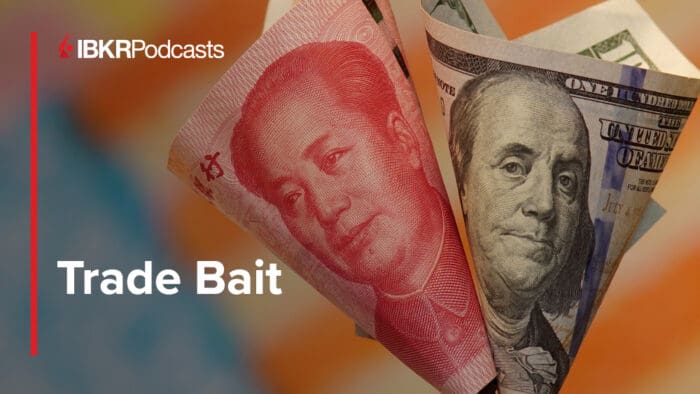Trade tensions are rising, markets are rattling, and no one is walking away unscathed. In this episode, we dive into the U.S.–China tariff battle to uncover who’s gaining ground—and who’s losing it fast.
Summary – IBKR Podcasts Ep. 251
The following is a summary of a live audio recording and may contain errors in spelling or grammar. Although IBKR has edited for clarity no material changes have been made.
Andrew Wilkinson
Tariff headlines continue to dominate the financial markets, and investors are having a hard time trying to figure out whether this ends well or badly. Economists continue to assign a significant chance to both U.S. and global recession. And while President Trump’s 90-day pause on the implementation of tariffs was welcomed by a wild yet temporary rally in share prices, the attitude towards China seems to be getting worse. Joining me is Xiaolin Chen, Head of International at KraneShares in London. Welcome, Xiaolin. How are you?
Xiaolin Chen
Very well, thank you for having me, Andrew.
Andrew Wilkinson
It’s always a pleasure. Let’s start with the recent exclusive Wall Street Journal article that claimed that U.S. Treasury Secretary Scott Bessent recently floated a plan to leverage better trade deals with the United States if each country agreed to isolate China. What do you make of this news story, Xiaolin?
Xiaolin Chen
That’s quite a major—impossible, let’s put it that way—because when the U.S. has negotiated the tariff deal with the whole world, it’s already setting itself up to a very challenging job on its own. Now all the other countries agreeing to isolate China, when we use China-produced products and China trade partnerships every day in and day out for even normal households, it’s very hard to agree on that. I would put that as “Mission Impossible.” I’d be very amazed and truly find it unbelievable for that to be achievable.
If you look at China’s exports over the last two decades, China has been actively reducing its export reliance on developed markets. Over the last two decades, China has increased its trade or exports to emerging markets, frontier markets, to their One Belt, One Road partners—with over a 28% increase. It shows time and time again that they have been diversifying their trade partnerships globally. Hence, it’s a challenge to say the rest of the world would also decouple from this country.
I think at the end of the day, maturity is needed here. Also, more constructive dialogue is needed. We need a plan for the world’s number one and number two to get back to the table, agree on a plan, and move forward from here. The end.
Andrew Wilkinso
Now, earlier this week, Trump declared that, and I’m quoting here, “The ball is in China’s court. China needs to make a deal with us. We don’t have to make a deal with them. There’s no difference between China and any other country, except they are much larger.” And then China announced that domestic airline companies should not place further orders with Boeing, the largest exporter by value in the U.S. Who really needs who most, Xiaolin?
Xiaolin Chen
We need both. We both need each other. Let’s just be honest here. Regardless of the numbers nominally, whatever the percentage, U.S. export to China—seven and a half percent of their proportion—where China’s, you know, buying things or exporting to the U.S., was only 2.3% of China’s GDP. I was looking up the numbers; surprisingly to me, the number came up really low. The exports that China does to the U.S. were only 2.3% of China’s GDP. It just shows again: diversification away from being a big partner-focused economy to broader diversification.
But anyway, the U.S. started this talk—this initiative, shall we call it. They have to have a very clear agenda. Let’s have a clear agenda: what do we aim to achieve? From me, sitting in London watching this whole situation develop and evolve, I personally felt there’s not much of a clear agenda. It’s quite disorganized. What do we aim to achieve? The first announcement of the tariff, announced by President Trump—Vietnam jumped on the call to say, “Hey, I will have 0% tariff on you, shall we make a deal?” He said, “I’ll call you back.” Andrew, that to me—you don’t really know what you want to achieve just yet. Okay, so we’ve got to have an agenda to say, listen, we want to do X, Y, Z. That’s not very clear. So far, I’ve not heard any progress. Maybe we shouldn’t be. Maybe we will be at some point. What is the plan? What’s the progress we have made with all these 70–75 countries that have been talking to the United States? Are we making deals? Where are we? And what’s the end goal?
And we have suddenly a pause of 90 days to give us a timeframe to get the deal done. The most important two partners in this whole world are China and the U.S. They have to sit down and talk. This is one way or the other. China imports airplanes—that’s why Boeing gets impacted—and energy from the U.S., also some semiconductor and electronics products, so on and so forth. And most importantly, agricultural products. They need to feed these billions of people. That’s why they have a very strong relationship—a treaty relationship—with the United States over all these years. They buy what they need.
But the goal is to say, you know what? We need The Art of the Deal version number two. Let’s talk about it. China could potentially increase what they need. And I found it interesting that both sides are waiting—I don’t know if it’s “you choose to wait for me to call you,” or “I’ll call you.” First, end of the day, what is going to hurt immediately is the U.S. exporter, because China is going to hold back on buying these agricultural products. If you increase tariffs by 125%, Andrew, that’s not viable to do any business. A 125% tariff. Period. The end.
So at this effective risk, nobody can do any business on both sides. Period. The end. The impact is high. I saw a few days ago Michigan released the index on sentiments in the U.S.—it’s plummeted by 11%. Inflation is expected to go up 6%. Mortgage rate in the U.S. is 7%. What are we doing? U.S. consumers will suffer a lot in the short term, which I don’t think they deserve to. They don’t deserve to suffer. We just need a clear agenda, be less disruptive to the market, and let’s talk respectfully and get the deal done.
Andrew Wilkinson
There are two potential additional policy tools that are possibly coming into play here, Xiaolin, and I’d just like to get your thoughts on both of them. Lately, the People’s Bank of China allowed the yuan to weaken against the U.S. dollar, and at the same time, yields on U.S. Treasuries rose markedly. Now, there’s not necessarily a clear link between the two—we all know that China is the largest holder of U.S. Treasuries—and we don’t know that Chinese authorities or anybody in particular was selling U.S. Treasuries, but it coincided with a big jump in U.S. Treasury yields. What are your thoughts on the effectiveness of these additional policy tools that may be coming into play as the trade wars begin?
Xiaolin Chen
So it’s very hard to decide, but in China, it’s very clear: they’re cutting rates again and again, for nine quarters by now. So interest rate direction in China is more clearly one way. It’s going to be more cuts. So, they’ve got to depreciate somehow. And China does still hold over 800 billion—probably in the 800 to 850 range—of U.S. Treasuries. The market is trying to get out. Are they trying to hurt the U.S. bond market? I sincerely think so far, at least based on the announcements—because once you trade, you announce—it’s not coming from China. So they’re not dumping the U.S. Treasury. They could, as the largest shareholder of U.S. Treasuries, but they chose not to, which I think is quite rational and mature in the way of dealing with the financial market.
That’s one. Second, and this time around, I think it surprised me and also surprised a lot of investors—it seems at the same time, when U.S. equities are having a tough time, the U.S. bond market is also having a tough time, and the U.S. dollar is also having a tough time. A lot of people are calling this “U.S. exceptionalism” probably diminishing, which I felt somehow proved to be true. Because usually, we have a moment where we say, “You know what, let’s sell and ask questions later,” and next, you buy with your cash in U.S. dollars. This time around, we didn’t see that trend happening. The market is being slightly more conservative, taking a bit of a cautious approach, saying, “This is somehow manufactured volatility introduced into this market.” So we’ve got to watch and decide what the next step is before this moves forward.
But I think if you look at policy domestically, China has very accommodative monetary policy, fiscal expansion, credit markets picking up, and consumer stimulus packages on the horizon. They claim they’re going to do 2 trillion this year to help the consumer. So I think they’re going to front-load a lot of those policies in the coming weeks to make sure they can counter and offset some of the downside risk that this trade discussion with the U.S. could bring.
I sincerely hope—we need a very clear agenda. We need to know how the government acts. In conjunction with the Fed—please talk to each other—so they can coordinate better with the markets. Because U.S. investors do not deserve this kind of volatility. Not at all. Most U.S. investors are very long-term, very mature; it’s household holdings of the U.S. equity market. We need certainties. Even if there’s a risk, we need to know why and where it comes from. Not this all of a sudden: “Here you go, my executive order, tariffs, and talks with the rest of the world.” I hope the U.S. will have a big announcement and agreements with some countries so at least they can make progress on this tariff front.
Andrew Wilkinson
Talking of volatility, Xiaolin, how have Chinese stock markets held up during this tariff turmoil?
Xiaolin Chen
Relatively well. If you look at just absolute performance, they actually outperform in a single digit compared to the rest of the world. But that’s really due to a couple of reasons. Fundamentally, Andrew, those stocks are very cheaply valued for years. Their valuation is really at a very attractive level. Second, those corporates are actually climbing back to their pre-pandemic profitable levels. You could say, “Hold on, but will this tariff talk impact their revenue?” Surprisingly, I’d say some names that are very well known in the U.S.—because they are listed on the stock exchange or NASDAQ—like big Chinese e-commerce companies, Alibaba, Pinduoduo, JD—all those companies collectively have an index, called the CSI China Index, that has all these names in one index. If you do the analysis, it shows China’s e-commerce companies holistically generate only 1.87%—less than 2%—of their revenue outside of mainland China.
So Chinese companies are less exposed to external shocks than we thought. Those companies hold up quite well for a couple of reasons: valuation, profits climbing back up, and third, they themselves are buying their own stock, saying, “Hey, I believe in my future.” They are showing the money. They have been issuing a lot of share repurchasing programs, each individually and consistently over time.
And one more important point: the national team, known as the Chinese national team, which is really just a combination of pensions, state monies, big insurance companies, and several big institutions, are buying. They introduced a market stabilizing fund worth a few trillion yuan. Every time they buy, they inform the market afterward. During this turmoil, what they did was to announce: “At this valuation, we are buying,” which gave confidence to local investors.
One, we are actually less exposed to external trade shocks, and two, we have the backup of the government team. So the market actually held up relatively well.
Andrew Wilkinson
My guest has been Xiaolin Chen, Head of International at KraneShares in London. Thank you very much for joining me, Xiaolin.
Xiaolin Chen
Thank you, Andrew.
Andrew Wilkinson
And a reminder to our listeners: if you enjoyed today’s episode, please consider subscribing wherever you get your podcasts. Thank you.
Disclosure: Interactive Brokers
The analysis in this material is provided for information only and is not and should not be construed as an offer to sell or the solicitation of an offer to buy any security. To the extent that this material discusses general market activity, industry or sector trends or other broad-based economic or political conditions, it should not be construed as research or investment advice. To the extent that it includes references to specific securities, commodities, currencies, or other instruments, those references do not constitute a recommendation by IBKR to buy, sell or hold such investments. This material does not and is not intended to take into account the particular financial conditions, investment objectives or requirements of individual customers. Before acting on this material, you should consider whether it is suitable for your particular circumstances and, as necessary, seek professional advice.
The views and opinions expressed herein are those of the author and do not necessarily reflect the views of Interactive Brokers, its affiliates, or its employees.
Disclosure: KraneShares
Content on China Last Night is for informational purposes only and should not be construed as investment advice. This material represents an assessment of the market environment at a specific time and is not intended to be a forecast of future events or a guarantee of future results; material is as of the dates noted and is subject to change without notice. This information should not be relied upon by the reader as research or investment advice regarding the funds or any security in particular.
This material may not be suitable for all investors and is not intended to be an offer, or the solicitation of any offer, to buy or sell any securities. Investing involves risk, including possible loss of principal.
This material contains general information only and does not take into account an individual’s financial circumstances. This information should not be relied upon as a primary basis for an investment decision. Rather, an assessment should be made as to whether the information is appropriate in individual circumstances and consideration should be given to talking to a financial advisor before making an investment decision.
Forward-looking statements (including Krane’s opinions, expectations, beliefs, plans, objectives, assumptions, or projections regarding future events or future results) contained in this presentation are based on a variety of estimates and assumptions by Krane. These statements generally are identified by words such as “believes,” “expects,” “predicts,” “intends,” “projects,” “plans,” “estimates,” “aims,” “foresees,” “anticipates,” “targets,” “should,” “likely,” and similar expressions. These also include statements about the future, including what “will” happen, which reflect Krane’s current beliefs. These estimates and assumptions are inherently uncertain and are subject to numerous business, industry, market, regulatory, geo-political, competitive, and financial risks that are outside of Krane’s control. The inclusion of forward-looking statements herein should not be regarded as an indication that Krane considers forward-looking statements to be a reliable prediction of future events and forward-looking statements should not be relied upon as such. Neither Krane nor any of its representatives has made or makes any representation to any person regarding forward-looking statements and neither of them intends to update or otherwise revise such forward-looking statements to reflect circumstances existing after the date when made or to reflect the occurrence of future events, even in the event that any or all of the assumptions underlying such forward-looking statements are later shown to be in error. Any investment strategies discussed herein are as of the date of the writing of this presentation and may be changed, modified, or exited at any time without notice.

















Join The Conversation
For specific platform feedback and suggestions, please submit it directly to our team using these instructions.
If you have an account-specific question or concern, please reach out to Client Services.
We encourage you to look through our FAQs before posting. Your question may already be covered!